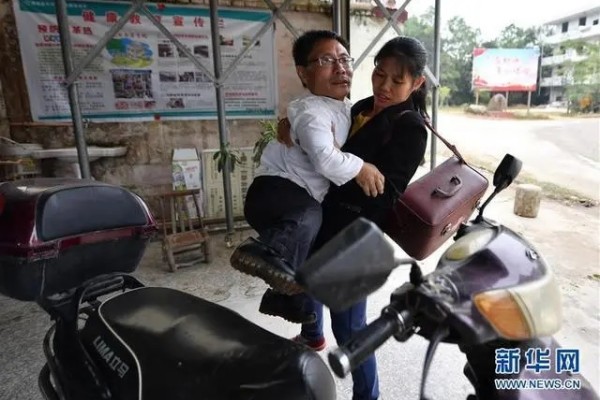
Doctor Xiao Jiulin and his wife. [File photo/Xinhua]
NANCHANG -- Doctor Xiao Jiulin needs time and strength to get on the chair in his consulting room: he wraps his arms around the seat, pulls himself up and adjusts his position to sit comfortably.
At 59, Xiao stands only 90 centimeters tall, about the size of a three-year-old child. He is the victim of a childhood disease that severely affected his bone development.
"Your blood pressure is still a bit high," Xiao told a patient after a routine check at his clinic in Yangang village of Yudu county, East China's Jiangxi province. "Take your medicine on time and avoid salty food."
Xiao normally needs to climb up and down the consulting room chair dozens of times a day. The only doctor at the clinic, he answers questions from patients, performs routine checks, prescribes medication and gives intramuscular and intravenous injections from time to time. His white coat is often soaked in sweat.
He needs to put in extra effort to do almost everything required by his job, such as standing on a stool to examine bedridden patients, and lowering the intravenous pole and leaning it against a wall to hang bags of liquid on its hook.
But nothing seems too difficult for Xiao, who dreamed of being a doctor at a very young age.
An ailing child, Xiao relied on the massage service of a village doctor to ease his severe muscular pains. That experience inspired him to become a doctor himself.
Yet it was all but impossible to fulfill his dream. His impoverished parents could not afford his education beyond high school, and he needed desperately to earn his own living. As a young adult, he learned palm-reading, but always longed to study medicine and save lives.
Xiao offered to be an apprentice for village doctors in his hometown and his perseverance eventually convinced one of them.
"The doctor asked me to use a syringe to draw medicine out of a vial, a kind of fine motor test," said Xiao. He did well and passed the test.
Starting in 1984, he apprenticed at the clinic in his home village for two years and then studied at a local medical school for another three years.
In 1989, he earned the qualification required to be a general practitioner and returned to his home village. But no patient came during his first five days at work. The villagers, unconvinced of his competence, would rather go to the neighboring villages for consultation.
"I refused to be frustrated, knowing that I needed to improve myself to gain their trust," said Xiao. He read medical books whenever he had time and cherished every patient who came to see him.
During a visit to provide primary home care to an elderly villager, his professionalism and kindness moved both the patient and her granddaughter. The young woman later became his wife and assistant.
Xiao makes about 3,000 yuan ($412) a month, just about the average income level in Jiangxi Province, but devotes all his time to his work.
"The clinic is open 24 hours a day, seven days a week and our mobile phones are always on," said Huang Shuzhen, Xiao's wife. "When the patients cannot find him, they will call me."
Today, the clinic provides primary care for at least 200 villagers, but as Xiao's reputation grows, more patients from neighboring areas come to consult him, too.
"We all trust Dr Xiao," said Luo Cixiu, 67. "It's so convenient to have a doctor close to home." A hypertension patient, Luo said a primary care visit costs her 27 yuan.
China is intensifying efforts to build a team of general practitioners for its vast rural areas. As of the end of 2021, nearly 1.15 million village doctors were working to provide timely and efficient primary care to the rural population, according to figures published by the National Health Commission.
The country will celebrate its national Doctors' Day on Saturday, an initiative to honor its clinical physicians and their vital role in society.
Dr Xiao knows the special date, but for him it is just another ordinary working day.